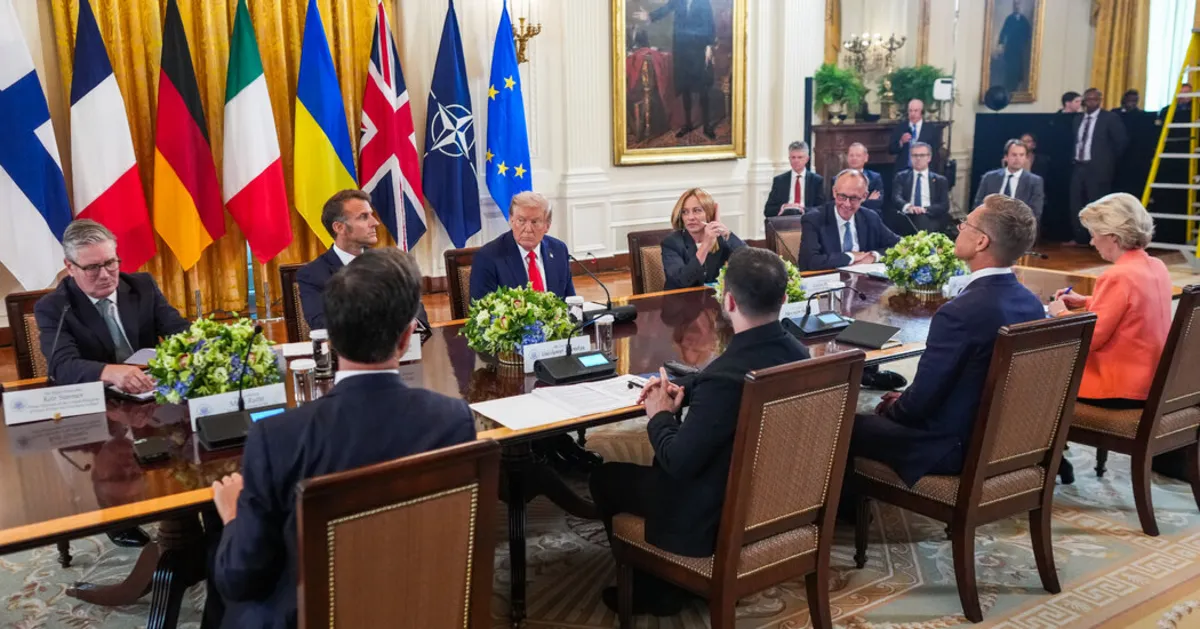
Over the past seven months, the leaders of the Western world have been engaged in an intensive course of Trumpology. One by one, presidents and prime ministers from European nations have made their way to Washington, D.C., absorbing invaluable lessons on how to effectively engage with the unpredictable individual who occupies the Oval Office. Recently, this learning experience culminated in a significant gathering at the White House, where the lessons learned were put to the test.
The spotlight during this grand meeting shone brightly on Ukrainian President Volodymyr Zelensky. Since his last visit, where he faced criticism for his informal attire, Zelensky returned to the Oval Office sporting a more formal outfit, demonstrating his understanding of the importance of perception in diplomacy. His demeanor was light-hearted, even bringing along a letter for First Lady Melania Trump. “I cannot believe it,” exclaimed President Donald Trump, visibly impressed by Zelensky's polished appearance. “I love it. Look at you.”
During their interaction, Zelensky humorously acknowledged the right-wing reporter Brian Glenn, who had previously mocked him for his clothing. “You are in the same suit. You see, I changed, you have not,” he quipped, prompting laughter all around. The Ukrainian leader presented a letter from his wife to Mrs. Trump, further lightening the mood. “It’s not to you, it’s to your wife,” he reminded Mr. Trump, who reacted with delight, saying, “I want it!”
The afternoon progressed as Trump and Zelensky joined leaders from Britain, Germany, Italy, France, and Finland in the ornate State Dining Room. The gathering also included NATO Secretary General Mark Rutte and European Commission President Ursula Von der Leyen, both of whom had navigated their own strategies to engage with Trump throughout the year. As they sat together, their goal was clear: to present a united front while addressing critical issues, notably the ongoing conflict in Ukraine.
During this high-stakes diplomatic meeting, the leaders expressed gratitude to Trump for his previous support, while subtly introducing their requests for a lasting security guarantee in Ukraine and an immediate cease-fire. However, the delicate balance of diplomacy was tested when German Chancellor Friedrich Merz asserted the necessity of a cease-fire more assertively than his counterparts. Previously, Trump had publicly shifted his stance, suggesting that a cease-fire was not essential for negotiations to proceed, leading to a moment of tension in the room.
As the meeting continued, the mood lightened again, but the responsibility of managing not only the global crisis at hand but also the temperament of one of the most unpredictable leaders was palpable. The atmosphere was charged with the dual demands of diplomacy and psychological acumen, with President Vladimir Putin of Russia looming in the background, influencing discussions without being present.
Throughout the summit, Trump frequently referenced Putin's perspective, claiming, “Vladimir Putin wants it to end,” and expressing a need to call the Russian leader to update him on the discussions. The European leaders maintained a stoic demeanor with each mention of Putin, seemingly unfazed by the Russian leader's shadow. The question lingered: who had mastered the art of appealing to Trump’s sensibilities more effectively—Putin or the European leaders?
After Trump’s previous engagement with Putin at their recent summit in Anchorage, it appeared he had incorporated some of the Russian leader's tactics regarding Ukraine. Yet, by the end of the meeting, it was evident that the European leaders had gleaned valuable insights from their interactions with Trump. “I had a very good meeting with distinguished guests,” Trump shared on social media, reflecting on the day’s events.
In conclusion, the ongoing lessons in Trumpology highlight the intricate dynamics of modern diplomacy, where attire, humor, and psychological strategies play crucial roles in international relations. The ability of leaders like Zelensky to adapt and navigate these complexities will undoubtedly shape the future of global politics.